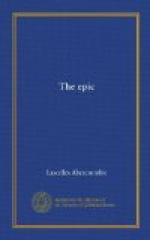It is because of all this that we have heard a good deal about the “authentic” epic getting “closer to its subject” than “literary” epic. It seems, on the face of it, very improbable that there should be any real difference here. No great poetry, of whatever kind, is conceivable unless the subject has become integrated with the poet’s mind and mood. Milton is as close to his subject, Virgil to his, as Homer to Achilles or the Saxon poet to Beowulf. What is really meant can be nothing but the greater insistence of racial tradition in the “authentic” epics. The subject of the Iliad is the fighting of heroes, with all its implications and consequences; the subject of the Odyssey is adventure and its opposite, the longing for safety and home; in Beowulf it is kingship—the ability to show man how to conquer the monstrous forces of his world; and so on. Such were the subjects which an imperious racial tradition pressed on the early epic poet, who delighted to be so governed. These were the matters which his people could understand, of which they could easily perceive the significance. For him, then, there could be no other matters than these, or the like of these. But it is not in such matters that a poet living in a time of less primitive and more expanded consciousness would find the highest importance. For a Roman, the chief matter for an epic poem would be Roman civilization; for a Puritan, it would be the relations of God and man. When, therefore, we consider how close to his subject an epic poet is, we must be careful to be quite clear what his subject is. And if he has gone beyond the immediate experiences of primitive society, we need not expect him to be as close as the early poets were to the fury of battle and the agony of wounds and the desolation of widows; or to the sensation of exploring beyond the familiar regions; or to the marsh-fiends and fire-drakes into which primitive imagination naturally translated the terrible unknown powers of the world. We need not, in a word, expect the “literary” epic to compete with the “authentic” epic; for the fact is, that the purpose of epic poetry, and therefore the nature of its subject, must continually develop. It is quite true that the later epics take over, to a very great extent, the methods and manners of the earlier poems; just as architecture hands on the style of wooden structure to an age that builds in stone, and again imposes the manners of stone construction on an age that builds in concrete and steel. But, in the case of epic at any rate, this is not merely the inertia of artistic convention. With the development of epic intention, and the subsequent choosing of themes larger and subtler than what common experience is wont to deal in, a certain duplicity becomes inevitable. The real intention of the Aeneid, and the real intention of Paradise Lost, are not easily brought into vivid apprehension. The natural thing to do, then, would be to use the




